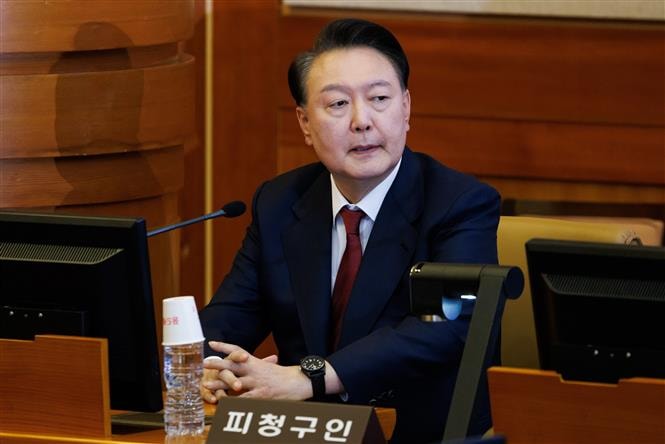President Yoon Suk Yeol will go on trial along with his former defense minister and others involved in his brief imposition of martial law.

South Korea's detained President Yoon Suk-yeol was formally indicted on January 26 on charges of leading a rebellion in December 2024 when he briefly imposed martial law, according to the New York Times.
The South Korean prosecutor's office announced today that it will continue to detain President Yoon. They decided to indict him on charges of being a "leader of a rebellion" due to the declaration of martial law on December 3, 2024.
The indictment against Mr. Yoon, announced by the South Korean Prosecutors’ Office on January 26, means his trial is likely to begin soon. The prosecutors’ office also indicted the former defense minister and several military generals and police chiefs, all of whom face criminal charges for allegedly helping Mr. Yoon commit similar crimes.
Yoon Suk Yeol is the first president in South Korean history to face criminal charges while still in office.
Mr Yoon’s downfall began when he unexpectedly declared martial law on December 3, 2024, accusing the opposition-controlled National Assembly of “paralysing” his government. The parliament voted down the measure, forcing him to rescind it after about six hours. But the incident triggered South Korea’s worst political crisis in decades.
While many called for Yoon's removal, the National Assembly impeached the President on December 14, suspending him from office. The Constitutional Court of South Korea is currently considering whether the National Assembly's impeachment was legal. If the court finds it legal, Yoon will be removed from office, and if the impeachment is illegal, he will be reinstated.
Meanwhile, criminal investigators arrested Mr. Yoon on charges of rebellion on January 15.
From his prison cell, President Yoon vowed to fight to regain office.
According to opinion polls, a majority of South Koreans approve of the president's impeachment and believe he committed sedition. But loyal supporters of Mr. Yoon have called the impeachment a "fraud." Some even vandalized a Seoul courthouse after one of its judges approved his arrest on January 19. Nearly 60 people have been arrested in connection with the unrest.
Prosecutors allege that Mr. Yoon committed sedition during martial law, when he banned all political activities and ordered military commanders to break down the doors of the National Assembly “with an axe” or “by shooting, if necessary” and “drag” lawmakers out. They said Mr. Yoon sent troops to occupy the National Assembly and arrest political leaders.
The nation watched live footage showing special forces armed with assault rifles storming the National Assembly as lawmakers gathered there to vote against martial law.
However, President Yoon has denied the sedition allegations, saying he never intended to disable the National Assembly or arrest political leaders. He said the military was there to “maintain order”.
Mr. Yoon's indictment, while not unexpected, came sooner than expected.
State prosecutors have also investigated the former defense minister and generals. The Corruption Investigation Office for Senior Officials (CIO) has taken over the rebellion case against Mr Yoon, but by law only prosecutors can prosecute him.
Mr. Yoon has refused to cooperate with the investigation; he and his lawyers insist that the four-year-old office has no authority to investigate him.
The CIO handed his case over to prosecutors on January 23. The two sides had previously agreed that prosecutors had until early February to indict Yoon, and prosecutors planned to investigate further into the impeached president’s actions.
But on January 24, a judge at a Seoul court ruled that Mr. Yoon should be prosecuted sooner or released because the CIO had completed its investigation.